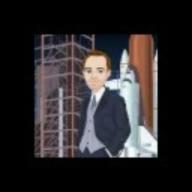How are photons being analyzed if they travel at lightspeed? Are and can they be studied after they "pass you by"?
2016-08-04 11:25 am
回答 (4)
2016-08-05 3:51 pm
"How are photons being analyzed if they travel at lightspeed?"
Absorption, stops them.
"Are and can they be studied after they "pass you by"?"
In some very minor sense. Let's say the Sun lost 0.0001% of its mass as photons, in some sort of step "blast of light" (and somehow we didn't die). We could detect a change the the orbits of Mercury, Venus, and Earth (and of course the outer planets) as the net mass these photons represented propagated out past us into the Universe at large.
Also, we can record photon detections on tape, and "interefere" them much later in a computation:
https://en.wikipedia.org/wiki/Very-long-baseline_interferometry
What light did you have in mind?
Absorption, stops them.
"Are and can they be studied after they "pass you by"?"
In some very minor sense. Let's say the Sun lost 0.0001% of its mass as photons, in some sort of step "blast of light" (and somehow we didn't die). We could detect a change the the orbits of Mercury, Venus, and Earth (and of course the outer planets) as the net mass these photons represented propagated out past us into the Universe at large.
Also, we can record photon detections on tape, and "interefere" them much later in a computation:
https://en.wikipedia.org/wiki/Very-long-baseline_interferometry
What light did you have in mind?
2016-08-04 5:16 pm
We can only analyze those photons that are absorbed by instruments... if the photon passes us by - we have no way of detecting it.
2016-08-04 1:00 pm
Heisenberg uncertainty principle applies. You can only examine a photon by interacting with it, and that means that you cause its behavior to change. If it has gone by, interaction opportunity is lost. You cannot examine it if it is no longer present.
Unless there is an interaction, the object of study might as well not be there (you cannot even know of its existence). It does nothing that can be observed. We do not actually directly observed ANYTHING. Our senses inform us of the results of interactions of things.
Unless there is an interaction, the object of study might as well not be there (you cannot even know of its existence). It does nothing that can be observed. We do not actually directly observed ANYTHING. Our senses inform us of the results of interactions of things.
2016-08-04 11:28 am
Photons can be slowed down
They only move at lightspeed in a vacuum (299 792 458 meters per second)
The slowest speed of light is 17 meters per second
They only move at lightspeed in a vacuum (299 792 458 meters per second)
The slowest speed of light is 17 meters per second
收錄日期: 2021-05-01 21:03:49
原文連結 [永久失效]:
https://hk.answers.yahoo.com/question/index?qid=20160804032500AAmXpyH



